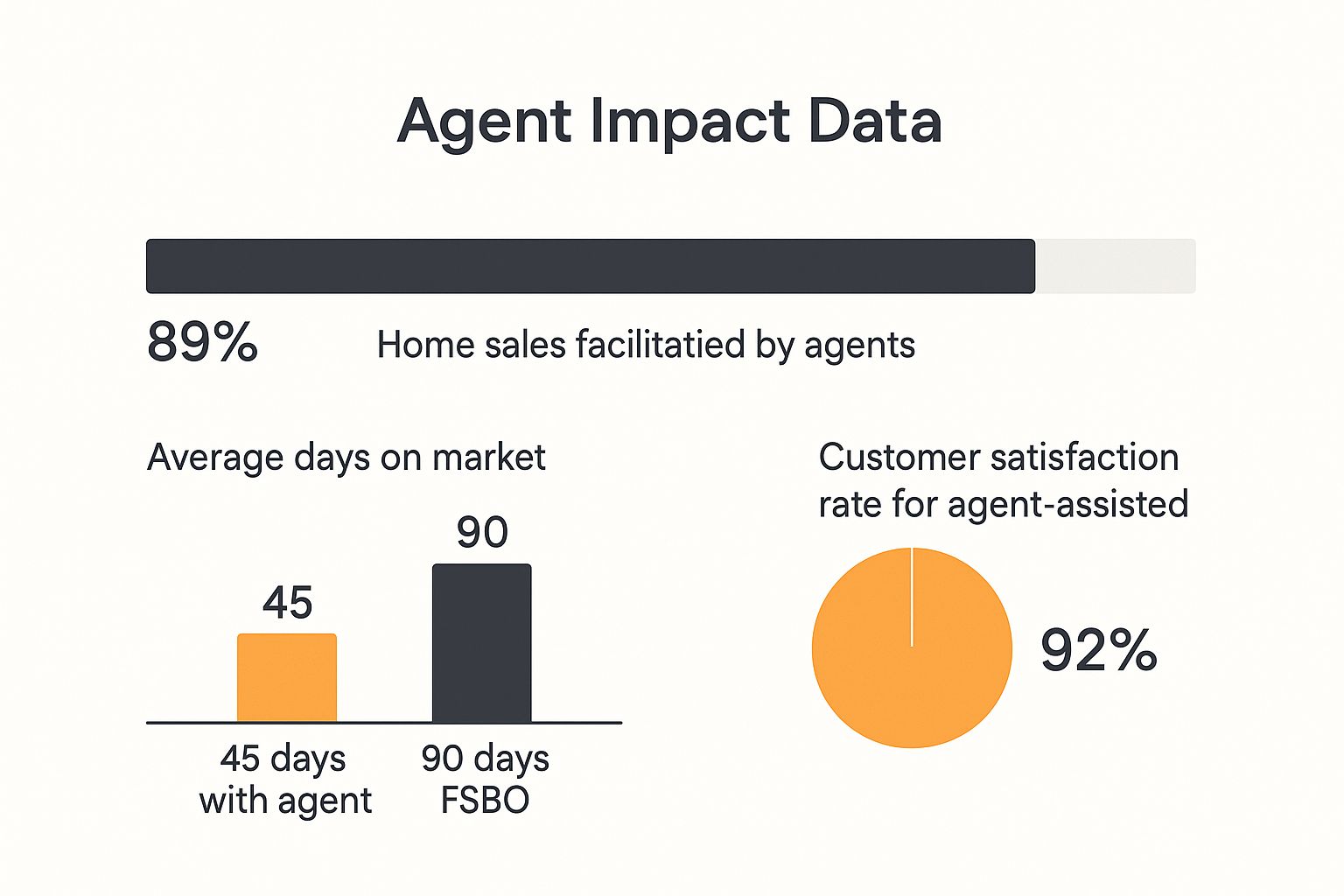Mastering Market Insights: How Elite Agents Stay Ahead

In the competitive Massachusetts real estate market, knowledge is power. Top agents distinguish themselves not just by sales, but by their deep understanding of market dynamics. This goes beyond listing prices; it's about anticipating shifts and empowering clients with data-driven insights for informed decisions. For a broader view of the real estate profession, see this resource: Realestateagents.
Utilizing Key Market Data Sources
Elite agents are masters of market data, transforming numbers into actionable strategies. They leverage multiple sources for a comprehensive market overview.
- Multiple Listing Service (MLS) data
- Local market reports
- Community networking insights
This multifaceted approach helps identify emerging trends, anticipate price fluctuations, and advise clients effectively. Understanding market absorption rates is especially crucial. Knowing the speed of inventory movement reveals the balance between supply and demand, essential for accurate pricing.
To help visualize the variety of resources available to agents, the table below compares some essential data sources:
Essential Market Data Sources for Real Estate Agents: A comparison of key data sources Massachusetts agents use to stay informed
| Data Source | Information Provided | Update Frequency | Cost | Best For |
|---|---|---|---|---|
| MLS | Listing data, sales history, property details | Real-time/Daily | Subscription fee | Agents needing up-to-the-minute data on available properties |
| Local Market Reports (e.g., from brokerages) | Neighborhood trends, median prices, sales volume | Weekly/Monthly | Varies, often free from brokerages | Agents looking for localized market overviews |
| The Warren Group | Statewide real estate data, including detailed reports & analytics | Monthly/Quarterly | Subscription fee | Agents needing in-depth statewide data and historical trends |
| Massachusetts Association of REALTORS® | Town-specific sales data, median prices, inventory levels | Monthly | Member benefit | Agents focused on specific town/city markets |
| Networking/Community Involvement | Qualitative insights, local development plans, upcoming projects | Ongoing | Time investment | Agents building local expertise and relationships |
This table highlights the range of resources available, from real-time MLS data to the qualitative insights gained through networking. Each source offers unique value for a well-rounded market perspective.
Visualizing Market Trends
Massachusetts agents face a competitive landscape, particularly in dynamic markets like Boston. The Massachusetts Association of REALTORS® provides valuable data, including town-specific reports. This empowers agents to tailor strategies to hyperlocal conditions. Boston agents, for example, must navigate multiple-offer scenarios and rapid market shifts. The data chart below visualizes key market indicators for the MA region, including median sale price, average days on market, and total sales volume.
The data shown in the chart below represents example data for illustrative purposes.

This data chart clearly reveals trends such as the consistent median sale price increase in Middlesex County, suggesting a strong seller's market. Conversely, the relatively stable average days on market in Worcester County points to a more balanced market.
Communicating Insights Effectively
Successful agents excel not only at gathering data but also at communicating it clearly to clients. They translate complex statistics into concise narratives, explaining how factors like rising interest rates impact affordability or how low inventory intensifies competition. This ability builds credibility and positions them as trusted advisors.
Clients rely on their agent’s expertise to navigate market intricacies, leading to greater satisfaction and successful transactions. Anticipating client questions and addressing potential concerns further strengthens the agent-client relationship and demonstrates a deep understanding of the market.
The Relationship Blueprint: Building a Client-Focused Practice

In the Massachusetts real estate market, closing a deal is only the first step. Successful real estate agents know that building lasting relationships is the key to a thriving business. This involves moving beyond the transaction itself and fostering genuine connections with clients.
This client-centric approach not only builds loyalty but also generates valuable referrals, significantly contributing to long-term growth.
Communication is Key
Effective communication is the foundation of any strong client relationship. Agents who excel in this area maintain consistent contact throughout the entire property journey. This includes providing regular updates, proactively addressing concerns, and being readily available for questions.
For example, agents might implement weekly check-in calls during the closing process or promptly respond to emails regarding property inquiries. This consistent communication builds trust and reinforces the agent's dedication to their clients.
Exceeding Expectations
Exceptional real estate agents consistently go above and beyond to exceed client expectations. This might involve accommodating specific needs, offering personalized advice, or providing resources that extend beyond the typical scope of service.
This commitment to exceeding expectations creates a memorable client experience that fosters positive word-of-mouth referrals. Furthermore, providing outstanding service, especially during challenging market conditions like those currently in the MA region, truly sets dedicated real estate agents apart. Check out our guide on How to master… for additional insights.
Building Relationships at Scale
Maintaining genuine client relationships can be challenging as a business expands. However, strategic systems and thoughtful approaches allow top agents to nurture these connections without sacrificing authenticity.
This could involve using a Customer Relationship Management (CRM) system to track client preferences and important dates or implementing a personalized follow-up process. These systems help agents stay organized and maintain meaningful contact, preventing interactions from feeling impersonal.
The Power of Follow-Up
A well-structured follow-up system is essential for staying top-of-mind with past clients. The key is to provide helpful and informative content, not to be overly aggressive.
This might include sending relevant market updates, congratulating clients on home anniversaries, or offering seasonal home maintenance tips. This type of proactive follow-up keeps the agent within the client's sphere of influence, positioning them as a valuable resource for future real estate needs. This transforms satisfied clients into enthusiastic advocates, generating referrals and contributing to a thriving business.
Strategic Pricing: The Science Behind Winning Valuations

Pricing a property accurately is crucial for success in the Massachusetts real estate market. It's more than just assigning a number; it's about understanding the local market and buyer/seller psychology. Mastering this balance separates top agents from the rest. Strategic pricing is the key to winning valuations. Learn more about real estate pricing to enhance your expertise.
Evaluating Comparable Properties: The Foundation of Accurate Pricing
The foundation of strategic pricing lies in analyzing comparable properties, commonly known as "comps." These are recently sold properties with similar size, features, and location to the target property. Comps provide a benchmark for determining realistic market value. However, simply looking at the numbers isn't enough.
Agents must consider unique features. For instance, a renovated kitchen or finished basement can significantly impact value compared to a similar property without these upgrades. You might be interested in: How to master… for further reading.
Navigating Pricing Conversations: Managing Expectations
One of the most challenging aspects of pricing is managing seller expectations. Agents must present data-driven insights clearly and respectfully, explaining how market conditions influence pricing. This requires strong communication skills and the ability to build trust.
If a seller insists on a price higher than comparable sales, the agent must explain potential consequences, such as longer time on market or price reductions. Agents also guide buyers, helping them formulate competitive offers in high-demand markets. This includes understanding buyer limitations and advising on strategies to maximize their success.
Adapting to Market Dynamics: Staying Ahead of the Curve
The real estate market is constantly changing, requiring pricing strategies to adapt. Rising home prices in Massachusetts are a significant factor impacting agents’ strategies. In 2025, home prices are projected to increase by 3-5%, indicating more sustainable growth. This affects how agents advise clients on pricing listings and crafting offers.
Let's take a closer look at regional trends influencing pricing strategies. The following table provides a snapshot of key market indicators across Massachusetts:
Regional Price Trends in Massachusetts
Comparison of median home prices and growth rates across major Massachusetts regions
| Region | Median Price | YoY Growth (%) | Inventory Level | Days on Market |
|---|---|---|---|---|
| Boston | $850,000 | 4.2% | Low | 30 |
| Worcester | $475,000 | 3.5% | Moderate | 45 |
| Springfield | $300,000 | 5.1% | High | 60 |
| Lowell | $525,000 | 2.8% | Low | 35 |
This data is illustrative and should not be considered financial advice. Consult with a real estate professional for specific market analysis.
As this data indicates, varying inventory levels and days on market across regions necessitate tailored pricing approaches.
In cities like Worcester, where the median home price has recently surged, agents must adjust their marketing. With rising prices, nearly 60% of homeowners in fast-appreciating areas consider selling. This creates opportunities for agents to engage potential sellers. Find more detailed statistics here.
Agents must stay informed about inventory levels, interest rates, and other economic factors. They must also adjust recommendations based on market dynamics, offering flexible and informed guidance.
Tech Integration That Actually Drives Results
Technology is reshaping the real estate landscape. However, it's not enough to simply adopt any new tool that appears. For Massachusetts real estate agents, selecting the right technology is crucial for achieving tangible success and maximizing their return on investment. This section examines the digital tools that truly deliver.
CRM Systems: Boosting Conversions and Client Management
Customer Relationship Management (CRM) systems are no longer optional; they're essential tools for today's real estate professionals. A robust CRM system goes beyond simple contact management. It facilitates automated follow-ups, provides effective lead tracking, and helps manage all client interactions efficiently.
- Automated Follow-up: CRMs automate email and text message sequences, ensuring that potential clients are nurtured consistently.
- Lead Tracking: Gain valuable insights into lead progress through the sales pipeline, enabling agents to identify both opportunities and areas needing improvement.
- Client Communication: Maintain a centralized hub for all client communication, ensuring a consistent and professional experience.
Selecting the right CRM can significantly boost conversion rates, freeing up agents to focus on relationship-building and deal-making.
Virtual Tours: Expanding Reach and Engagement
In a competitive market like Massachusetts, virtual tours are vital for effectively showcasing properties. These tours offer 24/7 access to potential buyers, breaking down geographical barriers and significantly expanding property reach.
- 3D Tours: Immersive 3D tours offer potential buyers a realistic and engaging property exploration experience.
- Video Walkthroughs: Guided video tours offer a personalized touch, highlighting key property features and providing valuable context.
- Interactive Floor Plans: Interactive floor plans enable buyers to visualize the property's layout and flow, improving their understanding of the space.
Virtual tours enhance the buyer's experience, generating increased interest and often leading to faster sales.
Automation Tools: Streamlining Operations and Saving Time
Automation tools play a key role in reducing administrative tasks for real estate agents. By automating repetitive processes, these tools free up valuable time, allowing agents to focus on client interaction and business growth.
- Automated Scheduling: Streamline appointment scheduling, eliminating the need for tedious back-and-forth communication.
- Document Management: Securely store and organize important documents, significantly improving efficiency and reducing paperwork.
- Marketing Automation: Automate email marketing campaigns and social media postings, ensuring consistent brand visibility and engagement.
Automating these essential tasks allows agents to focus on their core competencies: cultivating relationships, negotiating effectively, and delivering exceptional client service. This approach also results in cost savings by optimizing resource allocation and reducing time spent on administrative work. Ultimately, the strategic integration of automation tools contributes to a more scalable and sustainable real estate business.
Property Marketing That Captures Attention and Drives Action

In the competitive Massachusetts real estate market, simply listing a property is no longer sufficient. Savvy real estate agents recognize that effective marketing is key to attracting buyers and driving sales. This requires a comprehensive strategy that extends beyond traditional approaches.
Crafting Compelling Property Narratives
Successful Massachusetts real estate agents are skilled storytellers. They create engaging narratives that emphasize a property's key features and benefits, appealing to the emotional connection buyers crave. This involves showcasing unique selling points and painting a vivid picture of the lifestyle a property offers.
For example, highlighting a property's proximity to Boston's vibrant cultural scene or the serene tranquility of a Cape Cod coastal retreat can deeply resonate with potential buyers. This approach transforms a simple property listing into a desirable lifestyle opportunity.
Leveraging Digital and Traditional Channels
Effective real estate marketing necessitates a blended approach. Top agents utilize digital platforms like social media and online listings, while also incorporating traditional methods such as print advertising and open houses. This multi-channel strategy expands reach and ensures exposure to a broader audience.
Furthermore, targeted advertising through social media enables agents to connect with specific demographics. This focused approach increases the likelihood of reaching qualified prospects and generating genuine interest. For a deeper dive into these strategies, explore this resource: How to master….
Measuring Marketing Effectiveness: Metrics That Matter
Successful marketing is not solely about visibility; it's about achieving tangible results. Top agents monitor key metrics to assess the effectiveness of their campaigns. These metrics may include website traffic, lead generation, and conversion rates.
This data-driven approach allows for continuous optimization and ensures a strong return on investment. Analyzing website analytics, for instance, can pinpoint which marketing channels are generating the most qualified leads, allowing for strategic adjustments and resource allocation.
Balancing Visibility with Targeted Exposure
Leading real estate agents understand the importance of balancing broad visibility with targeted exposure. While maximizing reach is crucial, focusing on the right audience is equally vital. This involves identifying the ideal buyer profile for each property and tailoring marketing efforts accordingly.
For example, marketing a luxury condo in Boston would require a different strategy than marketing a single-family home in a suburban town. This targeted approach maximizes impact and ensures efficient use of marketing resources.
Case Studies: Replicable Success
Analyzing successful campaigns provides invaluable insights. By examining case studies of effective marketing strategies, agents can identify replicable tactics. This might involve studying how other agents have leveraged social media to generate leads or crafted compelling property descriptions that convert interest into action.
Analyzing successful campaigns across diverse property types and price points further refines this learning process. This allows agents to adapt proven strategies to their specific market niche. This commitment to continuous learning and adaptation is essential for staying ahead in the dynamic Massachusetts real estate landscape.
Negotiation Mastery: Techniques That Secure Optimal Outcomes
Negotiation is a cornerstone of real estate transactions. In Massachusetts, with its dynamic and varied market, mastering this skill is essential for real estate agents. Success hinges on understanding client needs, analyzing market dynamics, and utilizing effective communication strategies.
Preparing for Negotiations: Laying the Groundwork
High-performing real estate agents understand that preparation is key to successful negotiation. This includes in-depth research on comparable properties, a thorough understanding of current market trends, and anticipating potential obstacles. This groundwork allows agents to enter negotiations confidently and with a well-defined plan.
Knowing the average days on market for similar properties, for instance, provides valuable insights. Understanding the seller's motivations, whether it's a rapid sale or profit maximization, allows agents to tailor their negotiation strategy accordingly.
Managing Multiple-Offer Situations: Strategies for Success
Multiple-offer scenarios are commonplace in the competitive Massachusetts real estate market. Skilled real estate agents guide their buyers in crafting attractive offers that rise above the competition. This might involve emphasizing non-price related benefits such as flexible closing dates or waiving certain contingencies.
Clearly communicating the strengths of their buyer's offer to the seller's agent is also vital. Highlighting the buyer's commitment and financial security can significantly increase the chances of offer acceptance.
Navigating Inspection Challenges: Turning Obstacles into Opportunities
Inspections can sometimes reveal unexpected issues that threaten to derail a transaction. However, experienced negotiators view these challenges as opportunities for creative problem-solving. This could involve requesting repairs, negotiating a price adjustment, or working towards a compromise that benefits both buyer and seller.
Open communication between all parties involved is crucial in these situations. By focusing on finding mutually agreeable solutions, real estate agents can ensure a smooth closing, even when unforeseen problems arise.
Uncovering Motivations Beyond Price: The Human Element
Effective negotiation involves more than just discussing the price. It requires understanding the underlying motivations of everyone involved. Perhaps a seller prioritizes a quick closing due to an impending relocation, or a buyer places high value on specific property features.
By recognizing these underlying motivations, real estate agents can create win-win scenarios that address the core needs of both parties. This collaborative approach builds trust and leads to more positive outcomes.
Tactical Communication: Building Rapport and Achieving Results
Skilled negotiators utilize effective communication techniques to cultivate rapport and achieve their desired results. This includes active listening, clearly articulating client needs, and effectively managing expectations.
Maintaining a professional and respectful demeanor throughout the negotiation process is paramount. This creates a positive environment conducive to reaching mutually agreeable solutions. These tactics enable real estate agents to strengthen their position, safeguard client interests, and ultimately close more deals. This expertise often distinguishes exceptional real estate agents from the rest.
Building a Sustainable Practice: Beyond the Transaction
The Massachusetts real estate market is dynamic and demanding. Thriving in this environment requires real estate agents to build sustainable practices that extend beyond closing deals. This involves concentrating on long-term growth, preventing burnout, and establishing a business that supports both professional success and personal well-being.
Time Management: Working Smarter, Not Harder
Top-producing real estate agents in Massachusetts understand the importance of time. They implement strategic time management systems to maximize productivity without sacrificing their personal lives. This may include techniques like time blocking, prioritizing tasks, and using technology to automate routine activities.
For example, allocating specific blocks of time for client meetings, administrative work, and marketing activities ensures a balanced approach. This focused method allows agents to manage their time effectively, maximizing output without feeling overwhelmed.
Team Development: Building a Support System
As real estate agents expand their businesses, building a strong team is essential. This might involve hiring administrative staff, buyer's agents, or marketing professionals. Effective delegation is key, ensuring tasks are handled efficiently while maintaining quality.
Think of it as a well-oiled machine: each team member plays a vital role, contributing to smooth operations. This allows the lead agent to concentrate on high-level tasks like client relationships and strategic planning, promoting continued growth.
Financial Planning: Securing Long-Term Stability
Real estate agents often encounter fluctuating income. Implementing solid financial planning practices ensures long-term stability. This could involve budgeting, saving for retirement, and diversifying income streams.
Creating passive income streams within the real estate industry, like property management or investing in rental properties, offers additional financial security. This helps agents navigate market fluctuations and build a resilient, economically sound business.
Work-Life Balance: Avoiding Burnout
The demands of a real estate career can be strenuous. Top agents prioritize work-life balance by setting boundaries, scheduling downtime, and pursuing activities outside of work. This could include dedicating time for family, hobbies, or personal development.
Maintaining this balance is essential for mental and physical health. It allows agents to perform at their best, benefiting both their clients and their long-term career prospects.
Aligning Goals and Values: Defining Success
Sustaining a thriving practice involves aligning business goals with personal values. This means defining success beyond financial metrics, considering factors like client satisfaction, community impact, and personal fulfillment.
By defining these values, agents can create a rewarding career that aligns with their broader life goals. This comprehensive approach encourages long-term satisfaction and prevents disillusionment that can sometimes accompany a focus solely on financial gain. This alignment ensures continuous improvement and sustained well-being.
Are you ready to elevate your Massachusetts real estate career? Contact Rich Lion Properties today to learn how our resources and expertise can help you build a sustainable and successful real estate practice.



